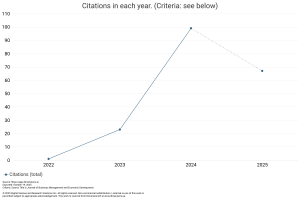Effects of Audit Fee, Audit Delay, Financial Distress, Audit Opinion and Audit Tenure on Auditor Switching
DOI:
https://doi.org/10.59653/jbmed.v1i02.87Keywords:
Audit Fee, audit delay, financial distress, Audit Opinion, Audit Tenure, auditor switchingAbstract
This study aims to analyze the Effect of Audit Fee, Audit Delay, Financial Distress, Audit Opinion and Audit Tenure on Auditor Switching (Empirical Studies of Manufacturing Companies in the Food and Beverage Sub-Sector Listed on the Indonesia Stock Exchange in 2019-2021) partially and simultaneously. This research data uses secondary data in annual reports of company on the Indonesia Stock Exchange (IDX) and the official website of the related company. The sample of this research is a Manufacturing Company in the Food and Beverage Sub Sector using a purposive sampling technique in taking the sample so that there are 21 samples with 3 years of observation (63 observations). The analysis technique used is logistic regression analysis technique using the SPSS 25 software application. The results of the R2 test show that the effect of the independent variable on the dependent variable is 71.9% and 28.1% is explained by other variables. Based on the test result, it is known that the variables Audit Fee, Audit Delay, Financial Distress, Audit Opinion and Audit Tenure simultaneously have a significant effect on Auditor Switching. The results showed that the variables of financial distress, audit opinion and audit tenure partially had a significant effect on auditor switching, while the variables audit fees and audit delay partially had no significant effect on auditor switching.
Downloads
References
Agoes, S. (2018). Auditing: Petunjuk Praktis Pemeriksaan Akuntan oleh Akuntan Publik (5th ed.). Salemba Empat.
Ardiyos. (2007). Kamus Akuntansi Publik. Citra Harta Prima.
Astrini, N. R., & Muid, D. (2013). Analisis Faktor-Faktor yang Mempengaruhi Perusahaan Melakukan Auditor Switching Secara Voluntary. Diponegoro Journal Of Accounting, 2(3), 1–11.
Carslaw, C. A. P. N., & Kaplan, S. E. (1991). An Examination of Audit Delay: Further Evidence from New Zealand. Accounting and Business Research, 22(85), 21–32. https://doi.org/10.1080/00014788.1991.9729414
Fauziyyah, W., Sondakh Jullie J, & Suwetja, I. G. (2019). Pengaruh Financial Distress, Ukuran Perusahaan, Opini Audit, dan Reputasi KAP Terhadap Auditor Switching secara Voluntary pada Perusahaan Manufaktur yang Terdaftar Di Bursa Efek Indonesia. Jurnal EMBA, 7(3), 3628–3637.
Gultom, E. (2019). Pengaruh Audit Delay, Fee Audit dan Audit Tenure. Prosiding Seminar Nasional Humanis.
Hartadi, B. (2009). Pengaruh Fee Audit, Rotasi KAP, dan Reputasi Auditor Terhadap Kualitas Audit Di Bursa Efek Indonesia. Ekuitas: Jurnal Ekonomi Dan Keuangan, 16(1), 84–103.
Ilhami, I. (2018). Pengaruh Pergantian Manajemen, Kesulitan Keuangan, Ukuran KAP, Audit Delay dan Opini Audit Terhadap Auditor Switching. Skripsi Universitas Islam Negeri Maulana Malik Ibrahim Malang.
Jensen, M. C., & Meckling, W. H. (1976). Theory of the Firm: Managerial Behavior, Agency Costs and Ownership Structure. In Journal of Financial Economics (Issue 4). Harvard University Press.
Lutfi, M., & Sari, D. A. (2019). Pengaruh Audit Delay, Opini Audit dan Audit Tenure Terhadap Pergantian Kantor Akuntan Publik (KAP) pada Perusahaan Manufaktur yang Terdaftar Di BEI Periode 2010-2015. Jurnal Ilmiah Akuntansi Rahmaniyah (JIAR), 2(2), 31–43.
Marisa, E. N., Heriansyah, K., & Zoebandi, F. (2022). Pengaruh Financial Distress, Fee Audit, Opini Audit dan Audit Delay Terhadap Auditor Switching (Studi Empiris pada Perusahaan Makanan dan Minuman yang Terdaftar BEI Tahun 2017-2020) (Vol. 2, Issue 2).
Maulana, T. (2015). Faktor-Faktor yang Mempengaruhi Kelemahan Material Pengendalian Internal pada Perusahaan Manufaktur yang Terdaftar Di Bursa Efek Indonesia.
Mulyadi. (2013). Auditing (6th ed., Vol. 2). Salemba Empat.
Nasser, A. T. A., Wahid, E. A., Nazri, S. N. F. S. M., & Hudaib, M. (2006). Auditor-Client Relationship: The Case of Audit Tenure and Auditor Switching in Malaysia. Managerial Auditing Journal, 21(7), 724–737. https://doi.org/10.1108/02686900610680512
Pawitri, N. M. P., & Yadnyana, K. (2015). Pengaruh Audit Delay, Opini Audit, Reputasi Auditor dan Pergantian Manajemen pada Voluntary Auditor Switching. E-Jurnal Akuntansi Universitas Udayana , 10(1), 214–228. https://doi.org/10.1
Rohmah, E. F., Astuti, D. saptantiah P., & Harimurti, F. (2018). Pengaruh Reputasi Auditor, Kepemilikan Publik, Audit Tenure, dan Audit Delay Terhadap Auditor Switching Secara Voluntary. Jurnal Akuntansi Dan Sistem Teknologi Informasi, 14(1), 60–68.
Ruroh, F. M., & Rahmawati, D. (2016). Pengaruh Pergantian Manajemen, Kesulitan Keuangan, Ukuran KAP, dan Audit Delay Terhadap Auditor Switching (Studi Kasus pada Perusahaan Manufaktur yang Terdaftar di Bursa Efek Indonesia Tahun 2012-2015). Jurnal Nominal, 5(2).
Schwartz, K. B., & Menon, K. (1985). Auditor Switches by Failing Firms. The Accounting Review, 60(2), 248–261.
Sembiring, E. E. (2016). Analisis Keakuratan Model Ohlson dalam Memprediksi Kebangkrutan (Delisting) Perusahaan yang Terdaftar di BEI. In Jurnal Akuntansi Keuangan dan Bisnis (Vol. 9).
Shockley, R. A. (1981). Perceptions of Auditors’ Independence: An Empirical Analysis. In Source: The Accounting Review (Vol. 56, Issue 4).
Sima, P. A. P., & Badera, I. D. N. (2018). Reputasi Auditor sebagai Pemoderasi Pengaruh Financial Distress dan Audit Fee pada Auditor Switching. E-Jurnal Akuntansi, 58. https://doi.org/10.24843/EJA.2018.v24.i01.p03
Stevani, C., & Siagian, V. (2020). Pengaruh Audit Delay, Audit Fee, dan Ukuran Perusahaan Terhadap Auditor Switching(Studi pada Perusahaan Sektor Industri Barang Konsumsi Terdaftar Di BEi 2016-2019).
Subiyanto, B., Digdowiseiso, K., & Debora, G. A. (2022). Pengaruh Fee Audit, Opini Audit dan Audit Delay terhadap Auditor Switching pada Perusahaan Sektor Industri Barang dan Konsumsi yang Terdaftar di BEI Periode 2015-2020. Jurnal Ilmiah Indonesia, 7(3). www.idx.co.id
Sumarwoto. (2006). Pengaruh Kebijakan Rotasi KAP Terhadap Kualitas Laporan Keuangan [Universitas Diponegoro]. https://www.researchgate.net/publication/277790465_Pengaruh_Kebijakan_Rotasi_KAP_Terhadap_Kualitas_Laporan_Keuangan
Tifanny, T., Rahayu, S., & Yustien, R. (2020). Determinan Ketepatan Waktu Pelaporan Keuangan Perusahaan Pertambangan Indonesia. Imanensi: Jurnal Ekonomi, Manajemen, Dan Akuntansi Islam, 5(1), 53–60. https://doi.org/10.34202/imanensi.5.1.2020.53-60
Verawati, N. M. A., & Wirakusuma, M. G. (2016). Pengaruh Pergantian Auditor, Reputasi KAP, Opini Audit dan Komite Audit pada Audit Delay. E-Jurnal Akuntansi Universitas Udayana, 17(2), 1083–1111.
Widnyani, N. L. E. D., & Muliartha, K. (2018). Pengaruh Opini Audit, Audit Fee, Reputasi KAP dan Ukuran Perusahaan Klien Terhadap Auditor Switching. E- Jurnal Akuntansi Universitas Udayana, 23(2), 1119–1145. https://doi.org/10.24843/EJA.2018.v23.i02.p12
Wijaya, E., & Rasmini, N. K. (2015). Pengaruh Audit Fee, Opini Going Concern, Financial Distress, Ukuran Perusahaan, Ukuran KAP pada Pergantian Auditor. E-Jurnal Akuntansi Universitas Udayana, 11(3), 940–966.
Downloads
Published
How to Cite
Issue
Section
License
Copyright (c) 2023 Rizqi Tiwi Kusuma Dewi, Sri Rahayu, Muhammad Ridwan

This work is licensed under a Creative Commons Attribution-ShareAlike 4.0 International License.
Authors who publish with this journal agree to the following terms:
- Authors retain copyright and grant the journal right of first publication with the work simultaneously licensed under a Creative Commons Attribution-ShareAlike that allows others to share the work with an acknowledgement of the work's authorship and initial publication in this journal.
- Authors are able to enter into separate, additional contractual arrangements for the non-exclusive distribution of the journal's published version of the work (e.g., post it to an institutional repository or publish it in a book), with an acknowledgement of its initial publication in this journal.
- Authors are permitted and encouraged to post their work online (e.g., in institutional repositories or on their website) prior to and during the submission process, as it can lead to productive exchanges, as well as earlier and greater citation of published work (See The Effect of Open Access).





























